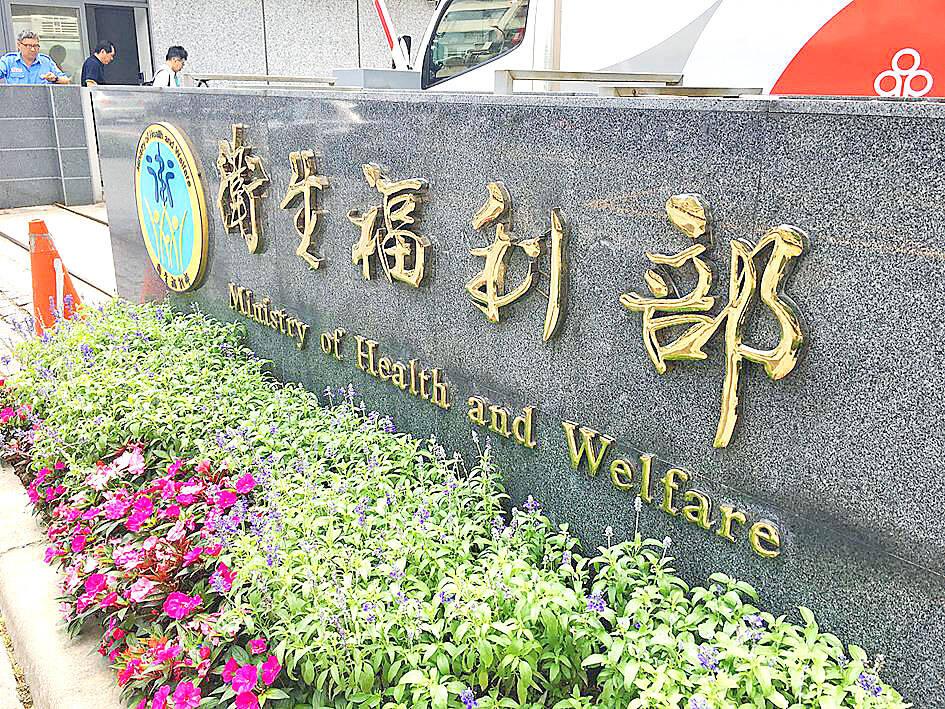About 220,000 people test positive for suspected cancer in screenings each year in Taiwan, but about 20 percent never receive follow-up tests or treatment, the Ministry of Health and Welfare said on Tuesday, adding that it would allocate NT$517 million (US$16.8 million) of National Health Insurance (NHI) funding to increase the follow-up rate.
Health Promotion Administration (HPA) data showed that 121,979 people were diagnosed with cancer in 2020 — meaning that one person in Taiwan is diagnosed every four minutes and 19 seconds, the ministry said.
However, as many cancers do not have any noticeable early symptoms, they are often not detected until it is too late, it said.

Photo: Lin Hui-chin, Taipei Times
The HPA offers five types of government-funded cancer screening for adults, and about 5 million people received the screenings each year prior to the COVID-19 pandemic, but only about 80 percent of those who test positive for cancer received follow-up tests and treatment, Minister of Health and Welfare Hsueh Jui-yuan (薛瑞元) said.
Those who test positive, but do not receive follow-up tests or early treatment could develop late-stage cancers, which would have worse prognoses and require more medical resources to treat, he said.
The HPA and the National Health Insurance Administration (NHIA) are today to launch a program working with hospitals to track suspected cancer cases from government-funded screenings and assist them in getting follow-up tests and treatment, he said.
The NHIA is to allocate NT$517 million to the program, with a goal to increase the rate of getting follow-up care to at least 90 percent, which is expected to benefit about 22,000 people, he added.
HPA Cancer Prevention and Control Division Director Lin Li-ju (林莉茹) said the program would establish a comprehensive mechanism for cancer screening, follow-up testing, diagnosing, administrating health consultations and referring people for treatment.
People who are eligible for government-funded screenings are advised to get them regularly, she said.
The five types of cancer screenings are fecal occult blood tests to detect colorectal cancer, oral cancer screenings, pap smears to detect cervical cancer, mammograms to detect breast cancer and low-dose computed tomography scans to detect lung cancer.
People who receive an abnormal test result do not have to panic, but they should follow instructions provided by the clinic or hospital and get a follow-up test for confirm the results, and seek early treatment if they are diagnosed with cancer, Lin said.
Regarding whether NHI funds should be used for preventive care rather than for treatment, Hsueh said the program would achieve both, as detecting diseases in their early stages and prescribing early treatment allows for more effective control over illnesses.
For example, people who receive an abnormal result from a fecal occult blood test might encouraged to get a colonoscopy, and if hyperplastic polyps are found and removed, it would not only qualify as preventive care, but as treatment, he said.

Chinese Nationalist Party (KMT) Chairman Eric Chu (朱立倫), spokeswoman Yang Chih-yu (楊智伃) and Legislator Hsieh Lung-chieh (謝龍介) would be summoned by police for questioning for leading an illegal assembly on Thursday evening last week, Minister of the Interior Liu Shyh-fang (劉世芳) said today. The three KMT officials led an assembly outside the Taipei City Prosecutors’ Office, a restricted area where public assembly is not allowed, protesting the questioning of several KMT staff and searches of KMT headquarters and offices in a recall petition forgery case. Chu, Yang and Hsieh are all suspected of contravening the Assembly and Parade Act (集會遊行法) by holding

PRAISE: Japanese visitor Takashi Kubota said the Taiwanese temple architecture images showcased in the AI Art Gallery were the most impressive displays he saw Taiwan does not have an official pavilion at the World Expo in Osaka, Japan, because of its diplomatic predicament, but the government-backed Tech World pavilion is drawing interest with its unique recreations of works by Taiwanese artists. The pavilion features an artificial intelligence (AI)-based art gallery showcasing works of famous Taiwanese artists from the Japanese colonial period using innovative technologies. Among its main simulated displays are Eastern gouache paintings by Chen Chin (陳進), Lin Yu-shan (林玉山) and Kuo Hsueh-hu (郭雪湖), who were the three young Taiwanese painters selected for the East Asian Painting exhibition in 1927. Gouache is a water-based

Taiwan would welcome the return of Honduras as a diplomatic ally if its next president decides to make such a move, Minister of Foreign Affairs Lin Chia-lung (林佳龍) said yesterday. “Of course, we would welcome Honduras if they want to restore diplomatic ties with Taiwan after their elections,” Lin said at a meeting of the legislature’s Foreign Affairs and National Defense Committee, when asked to comment on statements made by two of the three Honduran presidential candidates during the presidential campaign in the Central American country. Taiwan is paying close attention to the region as a whole in the wake of a

OFF-TARGET: More than 30,000 participants were expected to take part in the Games next month, but only 6,550 foreign and 19,400 Taiwanese athletes have registered Taipei city councilors yesterday blasted the organizers of next month’s World Masters Games over sudden timetable and venue changes, which they said have caused thousands of participants to back out of the international sporting event, among other organizational issues. They also cited visa delays and political interference by China as reasons many foreign athletes are requesting refunds for the event, to be held from May 17 to 30. Jointly organized by the Taipei and New Taipei City governments, the games have been rocked by numerous controversies since preparations began in 2020. Taipei City Councilor Lin Yen-feng (林延鳳) said yesterday that new measures by